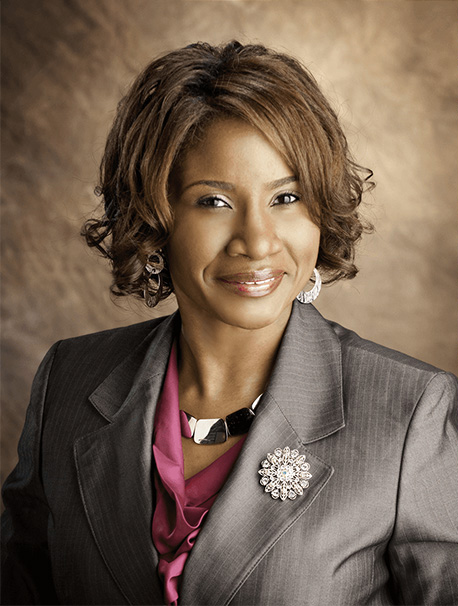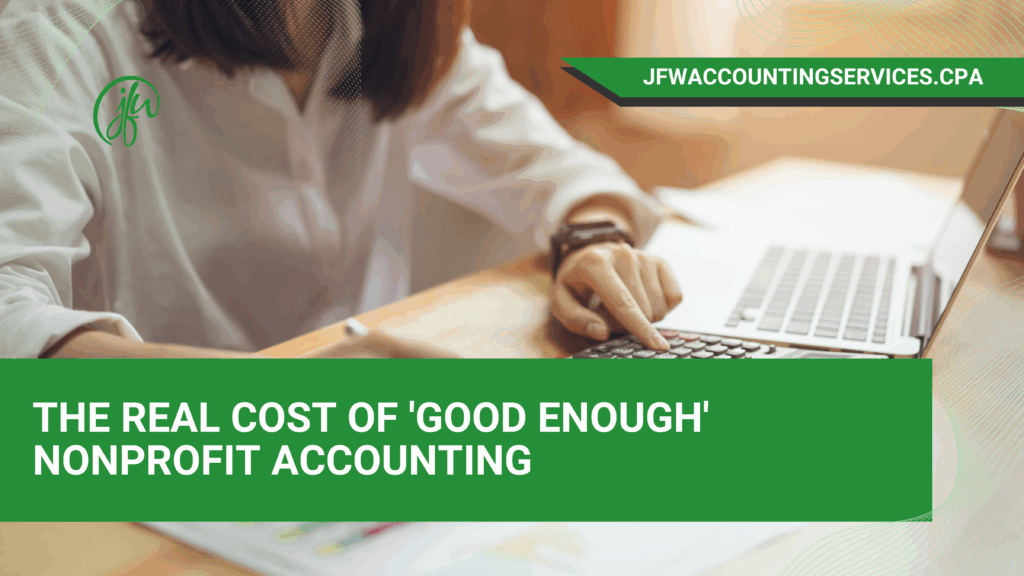Every executive director has heard the reassurance: “Don’t worry, we work with nonprofits sometimes.” But there’s a difference between occasionally serving nonprofit clients and building an entire practice around the sector’s unique requirements. That gap between “good enough” and genuinely specialized creates costs that many organizations don’t recognize until they’re facing a grant compliance audit, scrambling to meet reporting deadlines, or explaining discrepancies to their board.
Fund Accounting: Where Generalists Get Lost
Fund accounting is a unique system designed for nonprofit organizations to ensure that they honor donor restrictions and manage their resources responsibly, with financial statements that clearly present both restricted and unrestricted funds. This specialized approach tracks resources according to donor restrictions and grant requirements.
Generalist accountants, including both internal and external resources, often struggle with this framework. They may understand basic bookkeeping, but lack experience with the nuances of temporarily restricted funds, permanently restricted funds, and net asset classifications. When restrictions are imposed by donors, the accounting and recordkeeping requirements are of paramount importance, and this complexity makes accurate and reliable accounting especially important. When an accountant doesn’t understand how to properly segregate restricted and unrestricted resources, your organization faces real consequences. Expenses get charged to the wrong funding sources. Reports fail to show accurate fund balances. Your team spends hours correcting errors that should never have occurred.
Your board deserves accurate information, not financial statements that require extensive explanation because your accountant applied for-profit conventions to nonprofit scenarios.
Grant Compliance: High Stakes, Zero Room for Error
Managing multiple grants simultaneously can be overwhelming, especially for nonprofit organizations with limited administrative resources, as the complexity increases when tracking restricted versus unrestricted funds. Each federal grant comes with specific requirements for allowable costs, documentation standards, and reporting formats. State and private foundation grants add their own layers of complexity.
Generalist accountants often miss these requirements entirely. They may not understand the Uniform Guidance that governs federal grant compliance. They might fail to implement proper cost allocation methods. They could overlook matching requirements or time restrictions on grant spending.
The results are predictable. Grant reports arrive late. Documentation doesn’t meet funder standards. Your organization fails Single Audit testing. Funders question your financial management capacity, jeopardizing both current and future funding. Some grants require repayment when compliance violations occur, an outcome that can destabilize an entire organization’s finances for months and even years.
Organizations expending $1,000,000 or more in federal funds must undergo Single Audits that test compliance with federal grant requirements. These audits examine internal controls, review supporting documentation for sampled transactions, and verify adherence to specific grant conditions. When your accounting partner lacks nonprofit audit experience, preparation becomes chaotic. Your staff scrambles to produce documentation in formats they’ve never seen before. Auditors identify control weaknesses that specialized accountants would have prevented. The audit process takes longer and costs more than budgeted.
The Hidden Operational Costs
Beyond direct compliance risks, working with generalist accountants creates ongoing operational inefficiencies. Your finance director spends hours explaining nonprofit-specific requirements that a specialized accountant would already understand. Staff members waste time redoing reports that weren’t formatted correctly the first time. Board meetings get derailed by questions about financial presentations that don’t match nonprofit standards.
You lose institutional knowledge when accountants leave and their replacements must learn nonprofit requirements from scratch. This creates continuity gaps during leadership transitions—precisely when your organization needs stability most.
It’s important to consider the opportunity costs as well. While your team explains basic nonprofit concepts to your accounting partner, competing organizations with specialized support are applying for grants, expanding programs, and demonstrating financial strength to major donors. You’re not just maintaining the status quo; you’re falling behind.
What Specialized Nonprofit Accounting Delivers
After more than 25 years working exclusively with nonprofits, we’ve seen these patterns repeatedly. Organizations come to us after working with generalist accountants, often while preparing for their first major audit or after a grant compliance issue has raised red flags with funders.
The difference becomes clear immediately. Specialized nonprofit accountants speak your language, and can help you remember key details that often fall through the cracks, especially when you get busy. Instead, we make sure to:
- Understand each sector’s unique challenges
- Set up accounting systems that track restricted funds properly from day one
- Identify compliance requirements attached to different funding sources
- Proactively prepare for audits
This approach translates into concrete advantages and peace-of-mind for your organization. Financial reports arrive on time in formats that meet funder requirements. Your accounting operations support mission delivery rather than creating administrative burden. Board members receive clear financial information that informs strategic decisions. Grant applications include accurate financial data that strengthens your credibility with funders.
When you work with accountants who understand nonprofit operations deeply, you gain partners who anticipate needs before problems develop. We know when organizations typically face cash flow challenges. We understand seasonal patterns in donation revenue. We recognize signs that an organization is outgrowing its current systems and help plan for the next stage of growth.
The Bottom Line
“Good enough” accounting costs your nonprofit in ways that don’t appear on financial statements. Lost funding opportunities, compliance penalties, staff time, credibility damage, and operational inefficiency all represent real costs that specialized accounting expertise prevents.
Your mission deserves better than an accounting partner who’s still learning on your dime, especially when those dimes could be going towards your mission instead. Every hour your team spends explaining nonprofit basics to your accountant is an hour diverted from program delivery. Every grant report that requires multiple revisions weakens your relationships with funders. Every audit finding creates doubt about your organization’s financial management capacity.
The organizations that build lasting impact and sustainable operations don’t settle for “good enough” in any area critical to their mission. Financial management ranks among the most critical. Your accounting partner should strengthen your organization’s foundation, not create additional work for your already stretched team.
Contact us today to learn how our team can help strengthen your financial operations with decades of specialized nonprofit accounting experience. From implementing dependable accounting systems like Sage Intacct to providing audit-ready financials trusted by boards and funders, JFW Accounting Services offers the depth of nonprofit expertise that protects your credibility and supports your mission. Let’s discuss how specialized accounting support can help your organization focus on making a difference rather than explaining nonprofit basics to your financial partner.

Jo-Anne Williams Barnes, is a Certified Public Accountant (CPA) and Chartered Global Management Accountant (CGMA) holding a Master’s of Science in Accounting (MSA) and a Master’s in Business Administration (MBA). Additionally, she holds a Bachelor of Science (BS) in Accounting from the University of Baltimore and is a seasoned accounting professional with several years of experience in the field of managing financial records for non-profits, small, medium, and large businesses. Jo-Anne is a certified Sage Intacct Accounting and Implementation Specialist, a certified QuickBooks ProAdvisor, an AICPA Not-for-Profit Certificate II holder, and Standard for Excellence Licensed Consultant. Additionally, Jo-Anne is a member of American Institute of Certified Public Accountant (AICPA), Maryland Association of Certified Public Accountants (MACPA), and Greater Washington Society of Certified Public Accountants (GWSCPA) where she continues to keep abreast on the latest industry trends and changes.

